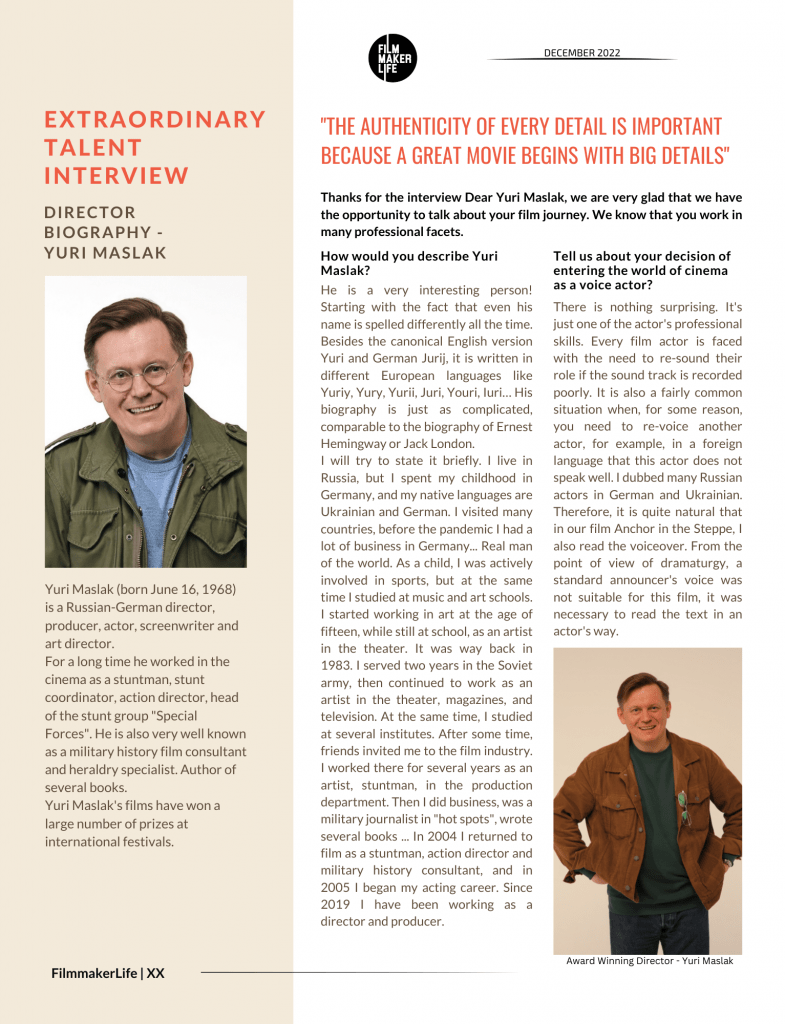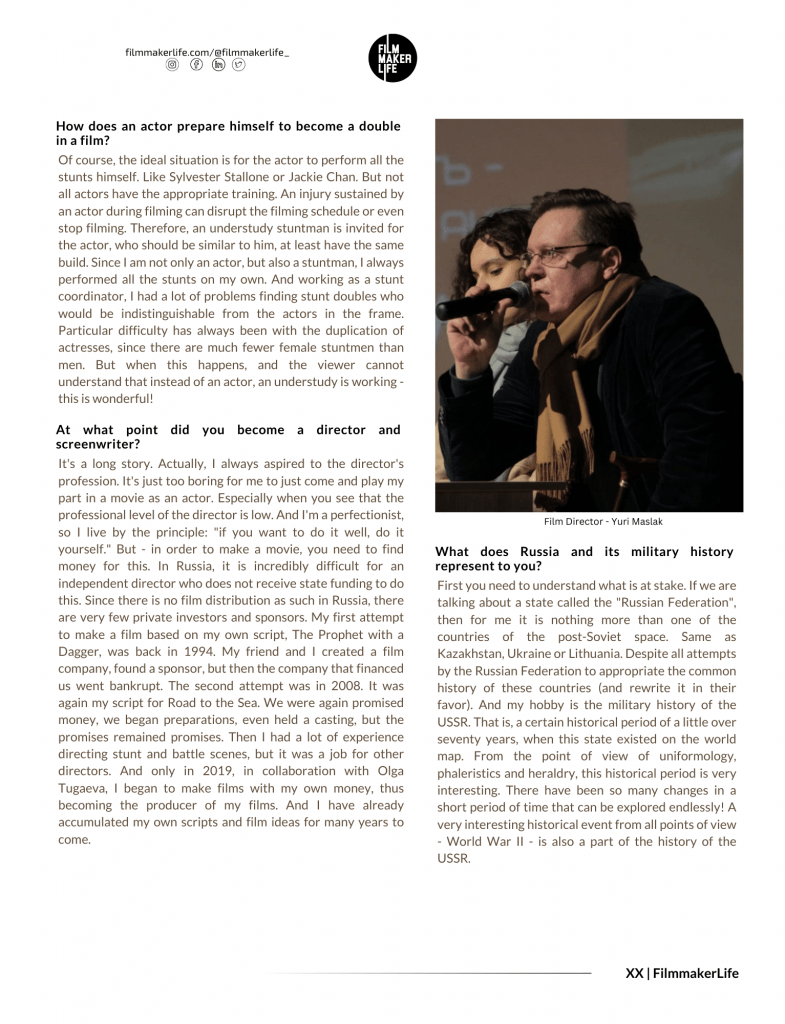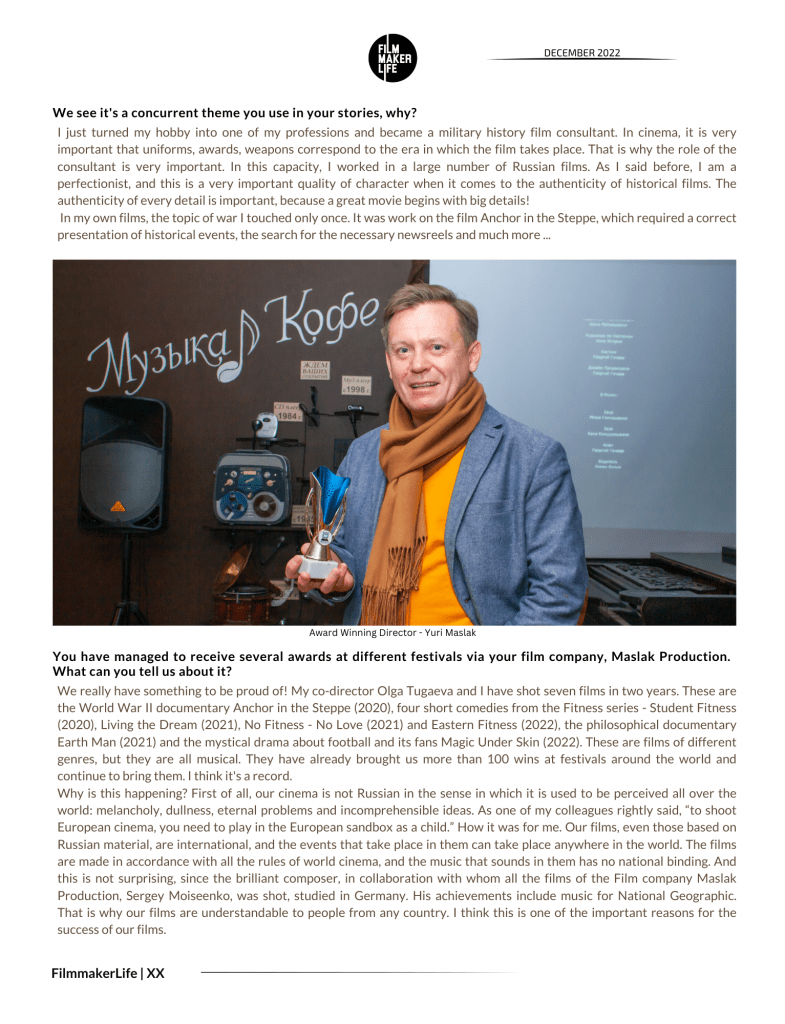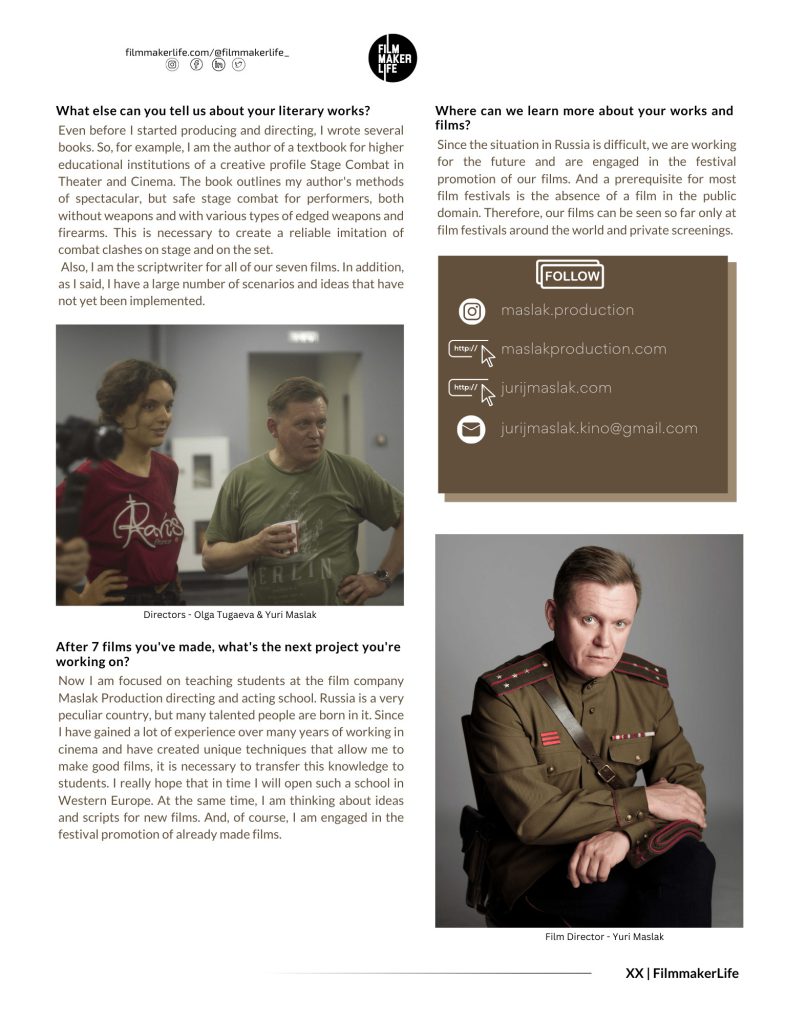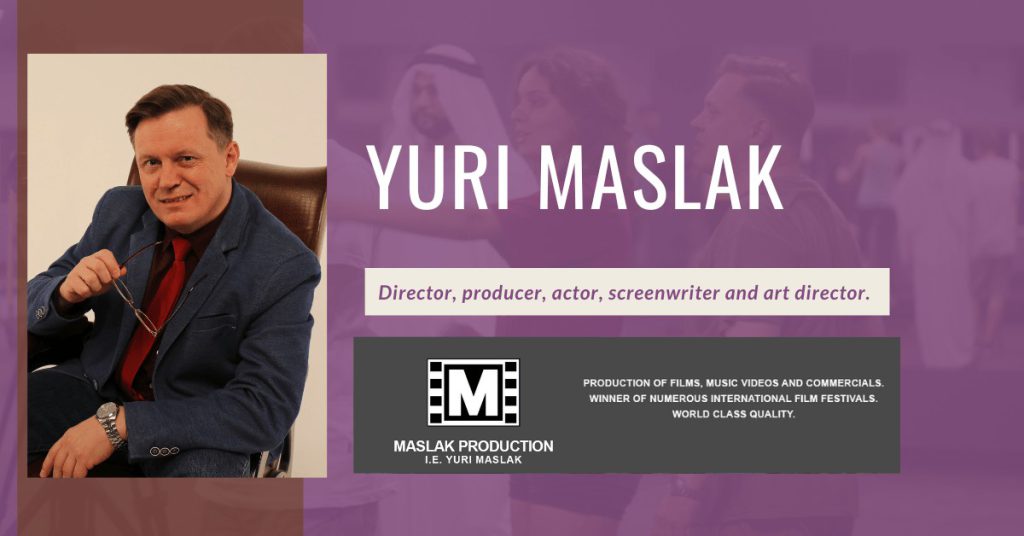Interview by FilmmakerLife – Extraordinary Talents
Yuri Maslak (born June 16, 1968) is a Russian-German director, producer, actor, screenwriter and art director.
For a long time, he worked in the cinema as a stuntman, stunt coordinator, action director, head of the stunt group “Special Forces”. He is also very well known as a military history film consultant and heraldry specialist. Author of several books.
Yuri Maslak’s films have won a large number of prizes at international festivals.
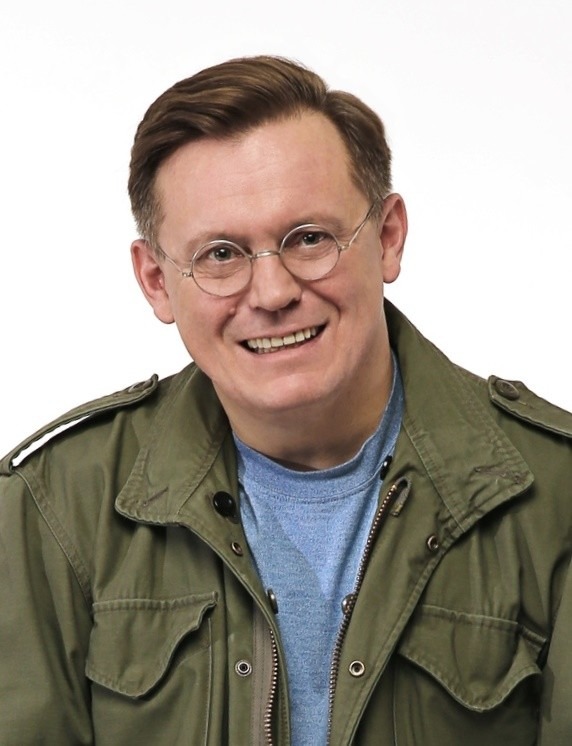
Thank you for the opportunity to interview you and learn more about your film journey.
How would you describe Yuri Maslak?
He is a very interesting person! Starting with the fact that even his name is spelled differently all the time. Besides the canonical English version Yuri and German Jurij, it is written in different European languages like Yuriy, Yury, Yurii, Juri, Youri, Iuri… His biography is just as complicated, comparable to the biography of Ernest Hemingway or Jack London.
I will try to state it briefly. I live in Russia, but I spent my childhood in Germany, and my native languages are Ukrainian and German. I visited many countries, before the pandemic I had a lot of business in Germany… Real man of the world. As a child, I was actively involved in sports, but at the same time I studied at music and art schools. I started working in art at the age of fifteen, while still at school, as an artist in the theater. It was way back in 1983. I served two years in the Soviet army, then continued to work as an artist in the theater, magazines, and television. At the same time, I studied at several institutes. After some time, friends invited me to the film industry. I worked there for several years as an artist, stuntman, in the production department. Then I did business, was a military journalist in “hot spots”, wrote several books … In 2004 I returned to film as a stuntman, action director and military history consultant, and in 2005 I began my acting career. Since 2019 I have been working as a director and producer.
Tell us about your decision of entering the world of cinema as a voice actor?
There is nothing surprising. It’s just one of the actor’s professional skills. Every film actor is faced with the need to re-sound their role if the sound track is recorded poorly. It is also a fairly common situation when, for some reason, you need to re-voice another actor, for example, in a foreign language that this actor does not speak well. I dubbed many Russian actors in German and Ukrainian. Therefore, it is quite natural that in our film Anchor in the Steppe, I also read the voiceover. From the point of view of dramaturgy, a standard announcer’s voice was not suitable for this film, it was necessary to read the text in an actor’s way.
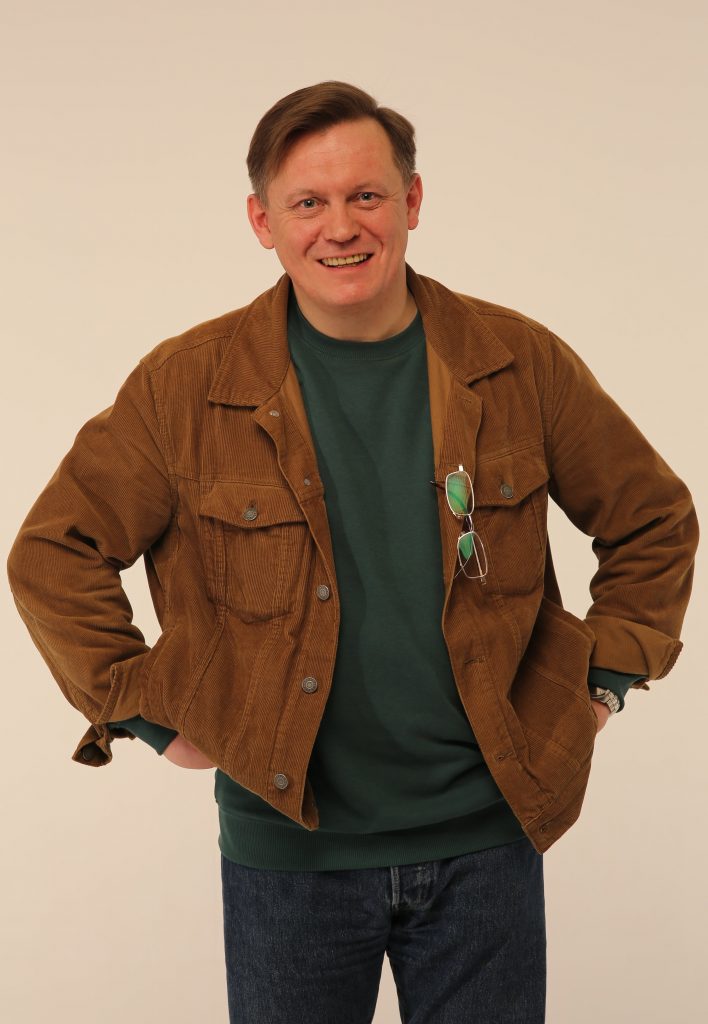
How does an actor prepare himself to become a double in a film?
Of course, the ideal situation is for the actor to perform all the stunts himself. Like Sylvester Stallone or Jackie Chan. But not all actors have the appropriate training. An injury sustained by an actor during filming can disrupt the filming schedule or even stop filming. Therefore, an understudy stuntman is invited for the actor, who should be similar to him, at least have the same build. Since I am not only an actor, but also a stuntman, I always performed all the stunts on my own. And working as a stunt coordinator, I had a lot of problems finding stunt doubles who would be indistinguishable from the actors in the frame. Particular difficulty has always been with the duplication of actresses, since there are much fewer female stuntmen than men. But when this happens, and the viewer cannot understand that instead of an actor, an understudy is working – this is wonderful!
At what point did you become a director and screenwriter?
It’s a long story. Actually, I always aspired to the director’s profession. It’s just too boring for me to just come and play my part in a movie as an actor. Especially when you see that the professional level of the director is low. And I’m a perfectionist, so I live by the principle: “if you want to do it well, do it yourself.” But – in order to make a movie, you need to find money for this. In Russia, it is incredibly difficult for an independent director who does not receive state funding to do this. Since there is no film distribution as such in Russia, there are very few private investors and sponsors. My first attempt to make a film based on my own script, The Prophet with a Dagger, was back in 1994. My friend and I created a film company, found a sponsor, but then the company that financed us went bankrupt. The second attempt was in 2008. It was again my script for Road to the Sea. We were again promised money, we began preparations, even held a casting, but the promises remained promises. Then I had a lot of experience directing stunt and battle scenes, but it was a job for other directors. And only in 2019, in collaboration with Olga Tugaeva, I began to make films with my own money, thus becoming the producer of my films. And I have already accumulated my own scripts and film ideas for many years to come.
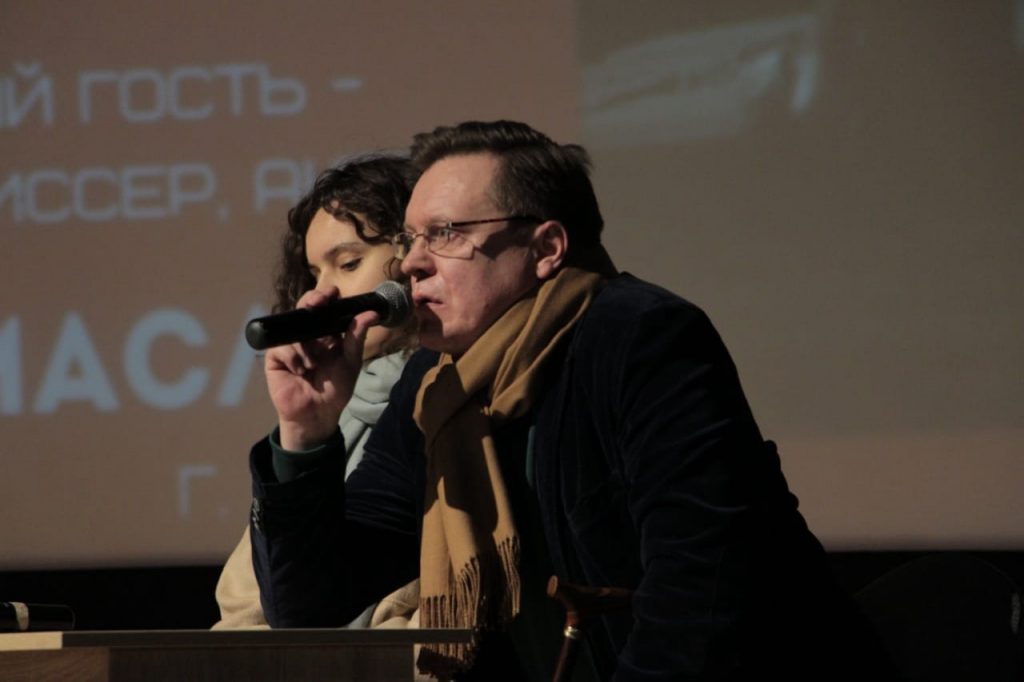
What does Russia and its military history represent to you?
First you need to understand what is at stake. If we are talking about a state called the “Russian Federation”, then for me it is nothing more than one of the countries of the post-Soviet space. Same as Kazakhstan, Ukraine or Lithuania. Despite all attempts by the Russian Federation to appropriate the common history of these countries (and rewrite it in their favor). And my hobby is the military history of the USSR. That is, a certain historical period of a little over seventy years, when this state existed on the world map. From the point of view of uniformology, phaleristics and heraldry, this historical period is very interesting. There have been so many changes in a short period of time that can be explored endlessly! A very interesting historical event from all points of view – World War II – is also a part of the history of the USSR.
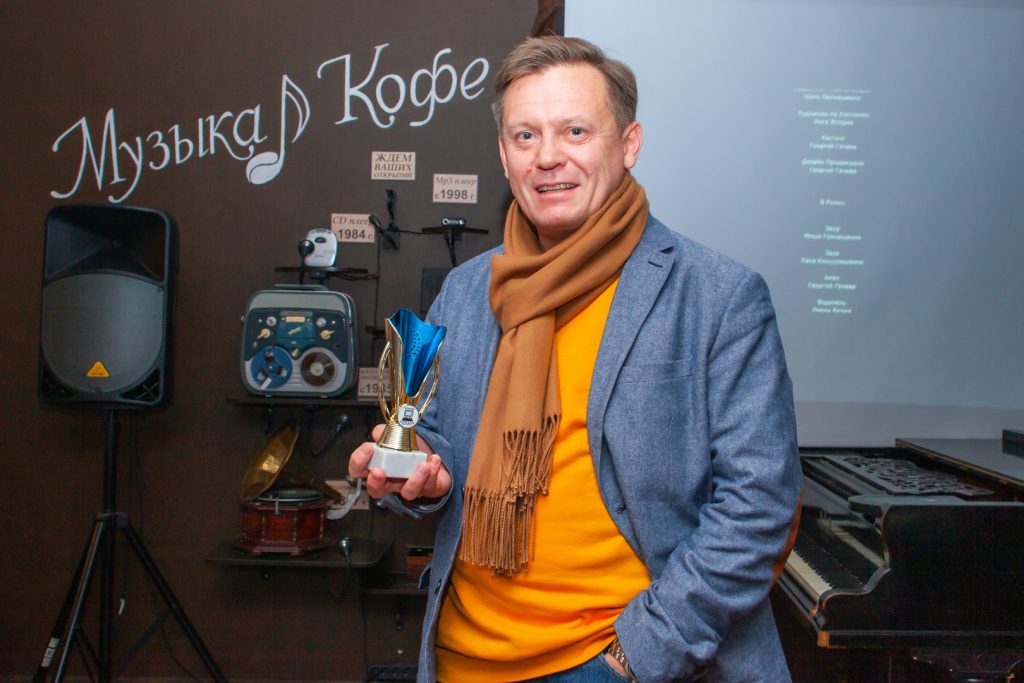
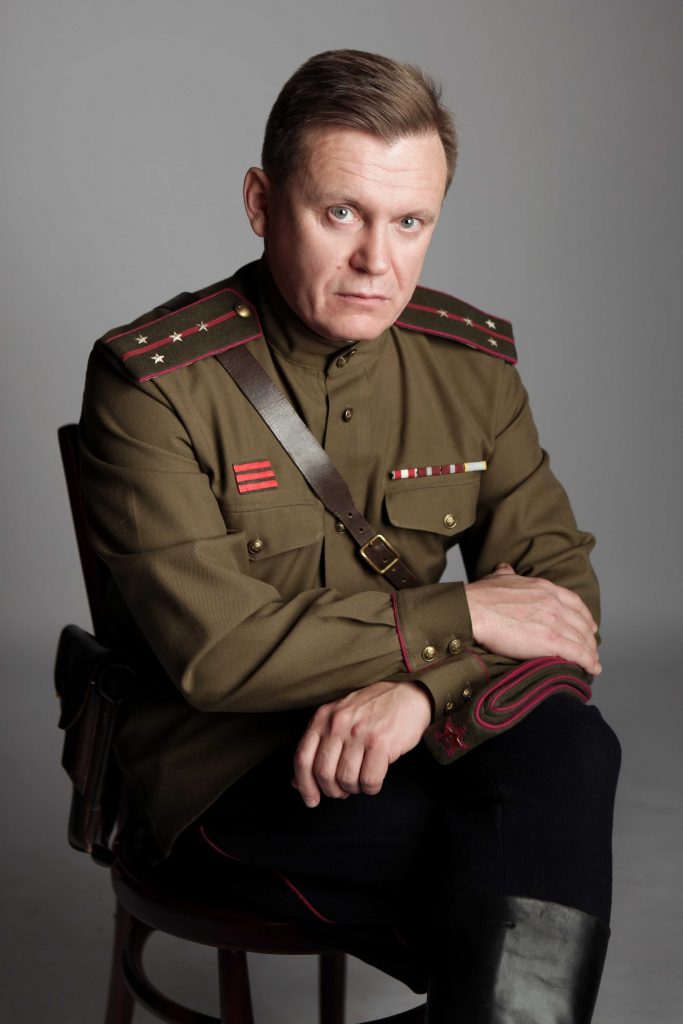
We see it’s a concurrent theme you use in your stories, why?
I just turned my hobby into one of my professions and became a military history film consultant. In cinema, it is very important that uniforms, awards, weapons correspond to the era in which the film takes place. That is why the role of the consultant is very important. In this capacity, I worked in a large number of Russian films. As I said before, I am a perfectionist, and this is a very important quality of character when it comes to the authenticity of historical films. The authenticity of every detail is important, because a great movie begins with big details!
In my own films, the topic of war I touched only once. It was work on the film Anchor in the Steppe, which required a correct presentation of historical events, the search for the necessary newsreels and much more …
You have managed to receive several awards at different festivals via your film company, Maslak Production. What can you tell us about it?
We really have something to be proud of! My co-director Olga Tugaeva and I have shot seven films in two years. These are the World War II documentary Anchor in the Steppe (2020), four short comedies from the Fitness series – Student Fitness (2020), Living the Dream (2021), No Fitness – No Love (2021) and Eastern Fitness (2022), the philosophical documentary Earth Man (2021) and the mystical drama about football and its fans Magic Under Skin (2022). These are films of different genres, but they are all musical. They have already brought us more than 100 wins at festivals around the world and continue to bring them. I think it’s a record.
Why is this happening? First of all, our cinema is not Russian in the sense in which it is used to be perceived all over the world: melancholy, dullness, eternal problems and incomprehensible ideas. As one of my colleagues rightly said, “to shoot European cinema, you need to play in the European sandbox as a child.” How it was for me. Our films, even those based on Russian material, are international, and the events that take place in them can take place anywhere in the world. The films are made in accordance with all the rules of world cinema, and the music that sounds in them has no national binding. And this is not surprising, since the brilliant composer, in collaboration with whom all the films of the Film company Maslak Production, Sergey Moiseenko, was shot, studied in Germany. His achievements include music for National Geographic. That is why our films are understandable to people from any country. I think this is one of the important reasons for the success of our films.
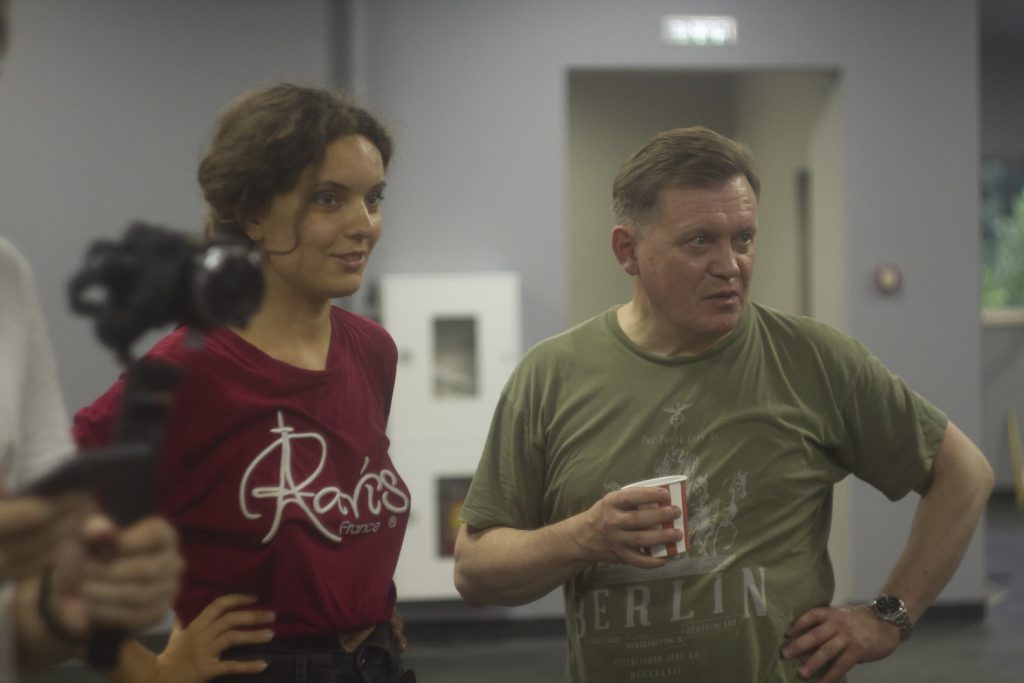
What else can you tell us about your literary works?
Even before I started producing and directing, I wrote several books. So, for example, I am the author of a textbook for higher educational institutions of a creative profile Stage Combat in Theater and Cinema. The book outlines my author’s methods of spectacular, but safe stage combat for performers, both without weapons and with various types of edged weapons and firearms. This is necessary to create a reliable imitation of combat clashes on stage and on the set.
Also, I am the scriptwriter for all of our seven films. In addition, as I said, I have a large number of scenarios and ideas that have not yet been implemented.
After 7 films you’ve made, what’s the next project you’re working on?
Now I am focused on teaching students at the film company Maslak Production directing and acting school. Russia is a very peculiar country, but many talented people are born in it. Since I have gained a lot of experience over many years of working in cinema and have created unique techniques that allow me to make good films, it is necessary to transfer this knowledge to students. I really hope that in time I will open such a school in Western Europe. At the same time, I am thinking about ideas and scripts for new films. And, of course, I am engaged in the festival promotion of already made films.
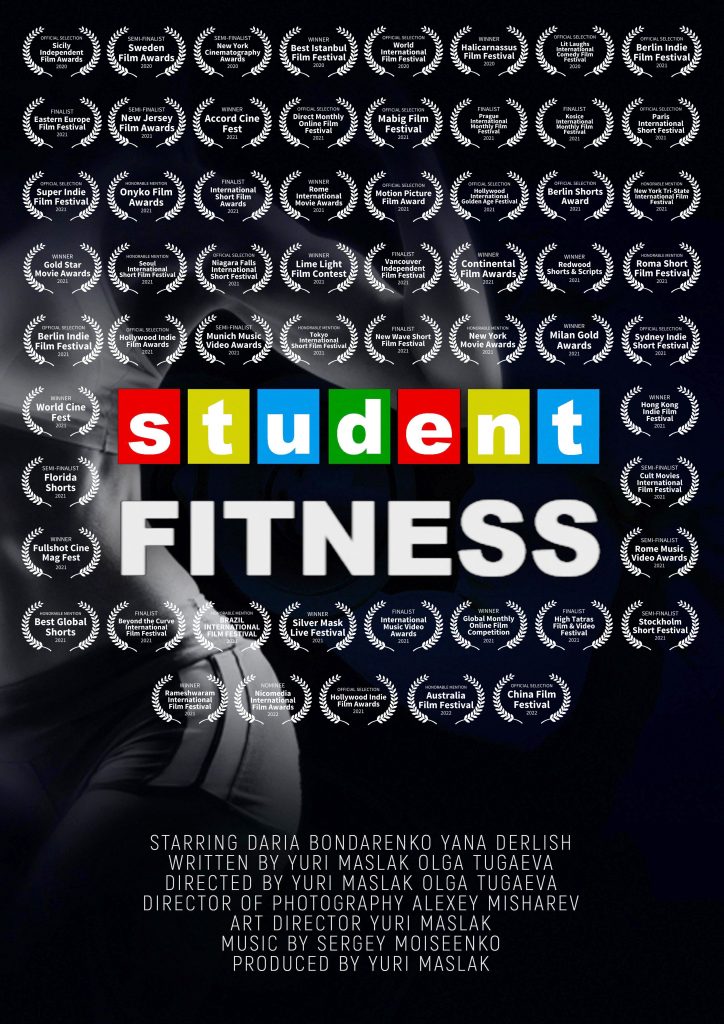
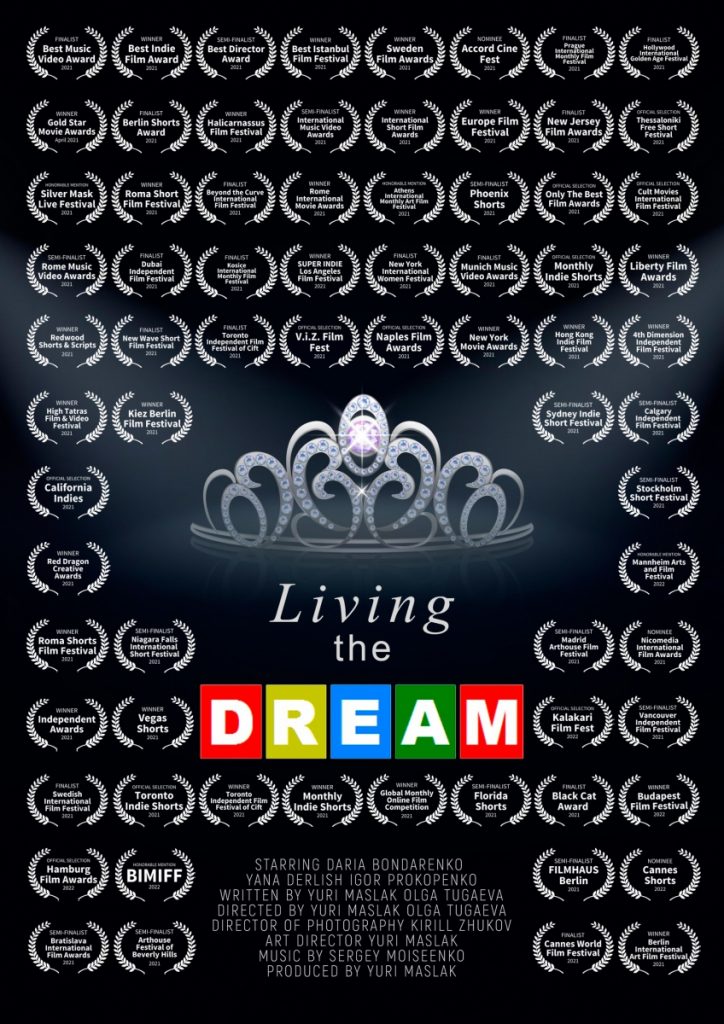
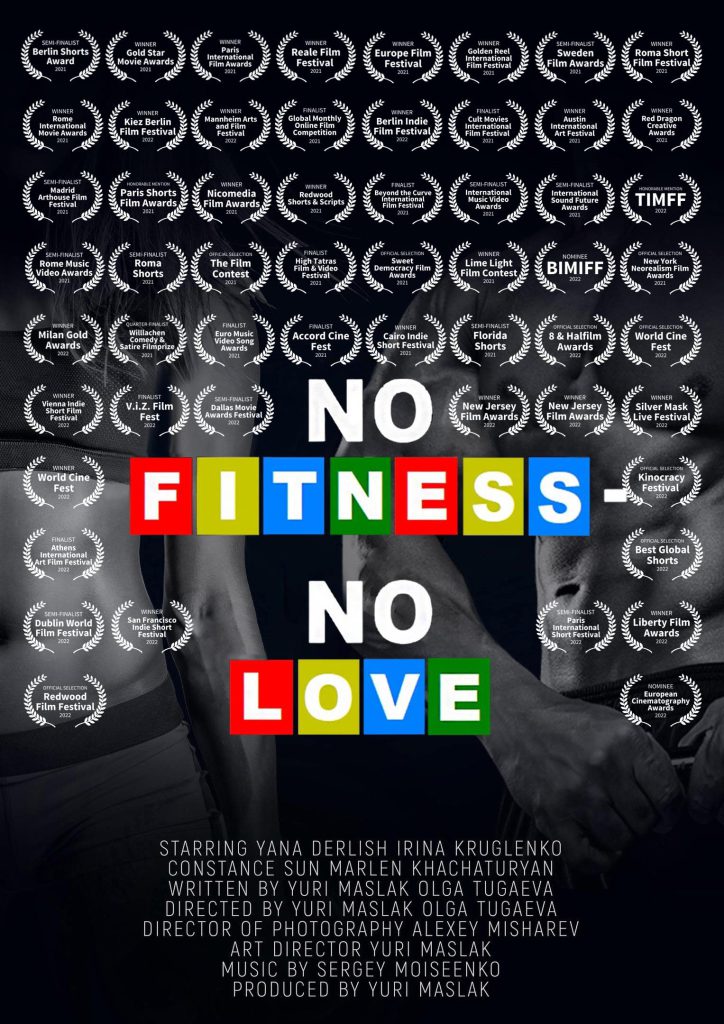
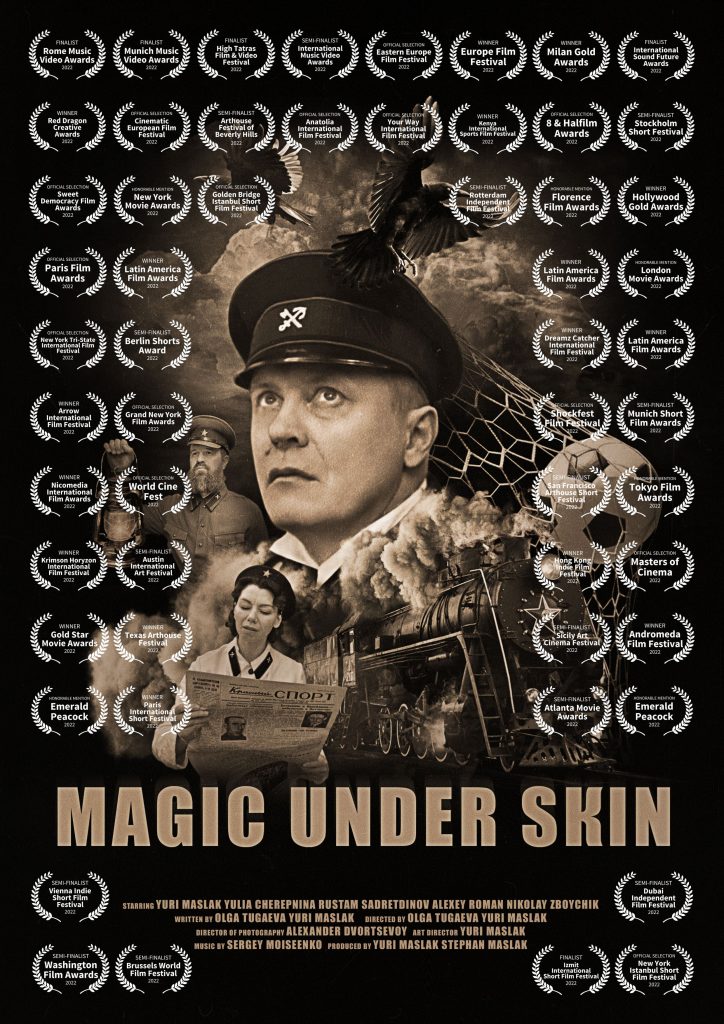
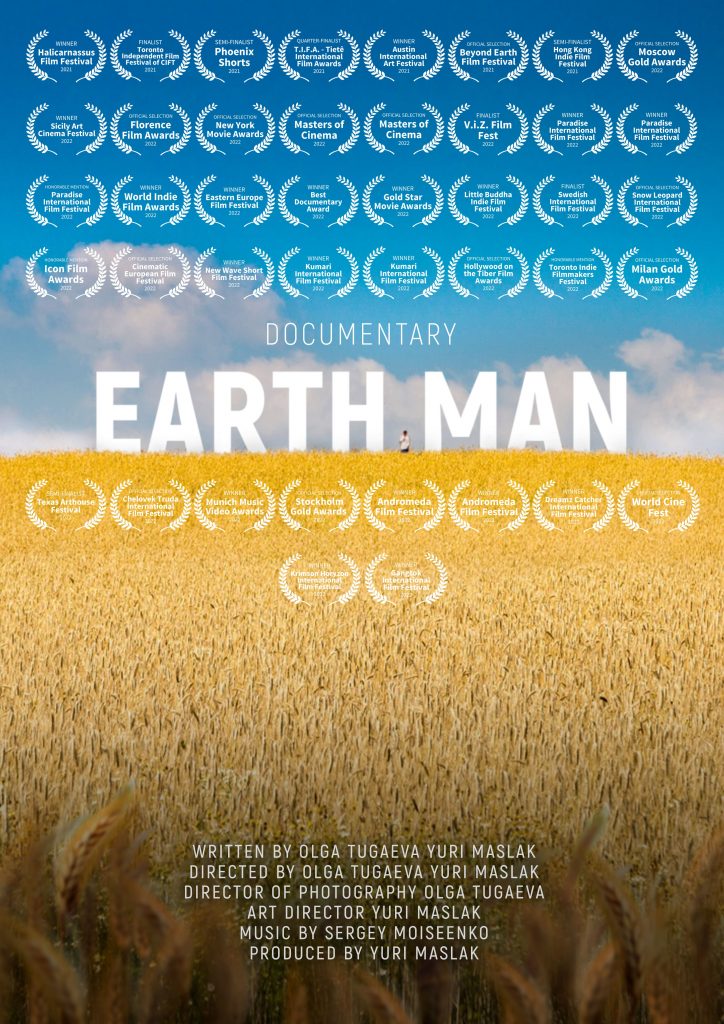
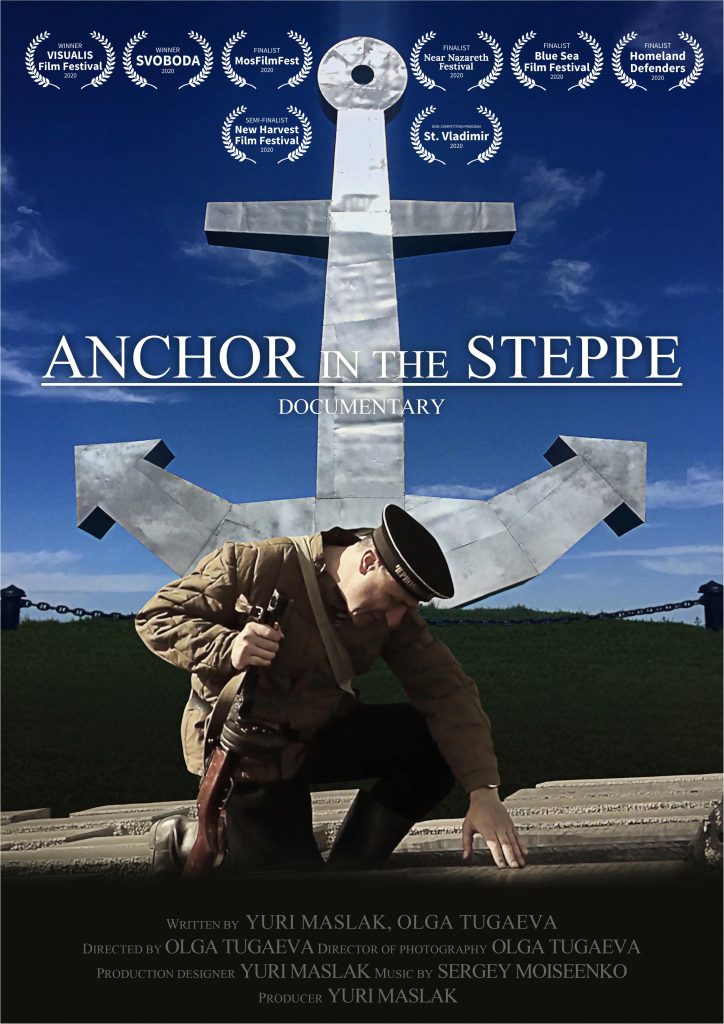
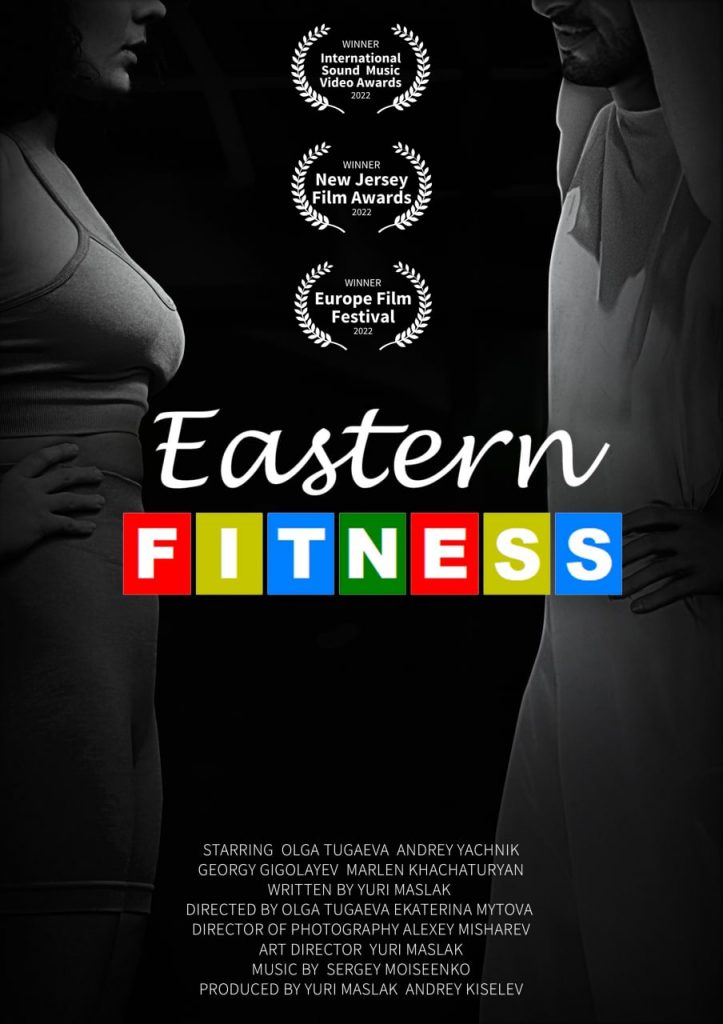
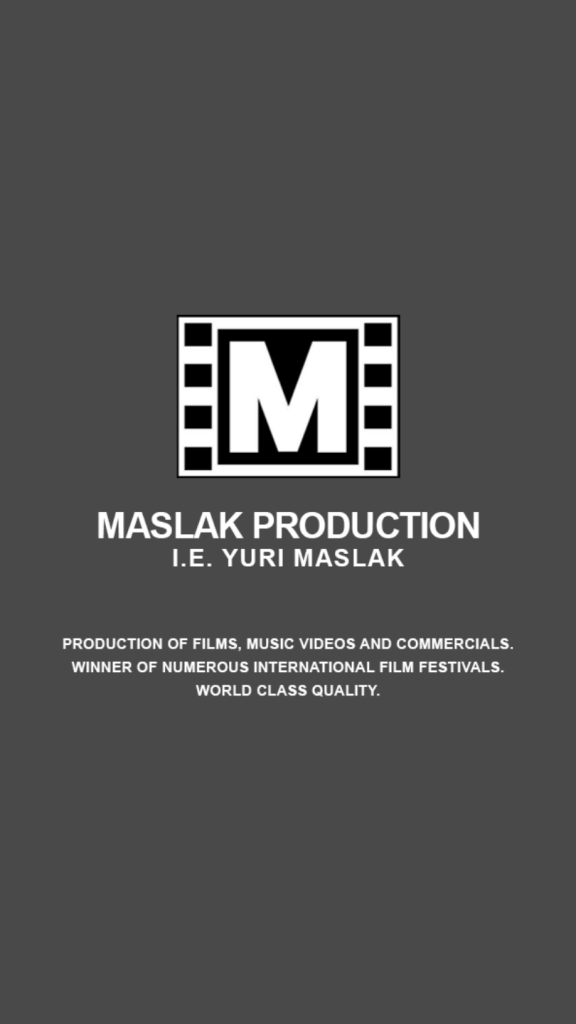
Where do you see yourself next with your passion for cinema?
I want to do a lot more. But, unfortunately, in modern Russia, I do not see the prospects for the development of cinema. I may have to change something in my life… But I really hope that our team will continue to make films!
We have a lot of interesting ideas, we are thinking about new as well as ongoing projects. Such as Fitness for example. This is a series of short musical comedies, united by the theme of fitness, in which women’s complexes are subtly beaten. Judging by the number of festivals wins that the first four films in the series have received, this could be a long-running and rated internet series. I hope we get an order for its continuation from some European or American streaming platform.
Where can we learn more about your works and films?
Since the situation in Russia is difficult, we are working for the future and are engaged in the festival promotion of our films. And a prerequisite for most film festivals is the absence of a film in the public domain. Therefore, our films can be seen so far only at film festivals around the world and private screenings.
Connecting to Yuri Maslak
Yuri Maslak’s official website (German/Russian)
Film company Maslak Production official website (English/German/Russian)
This Extraordinary Talent Interview has been published in the December 2022 Edition of the FilmmakerLife Magazine.
